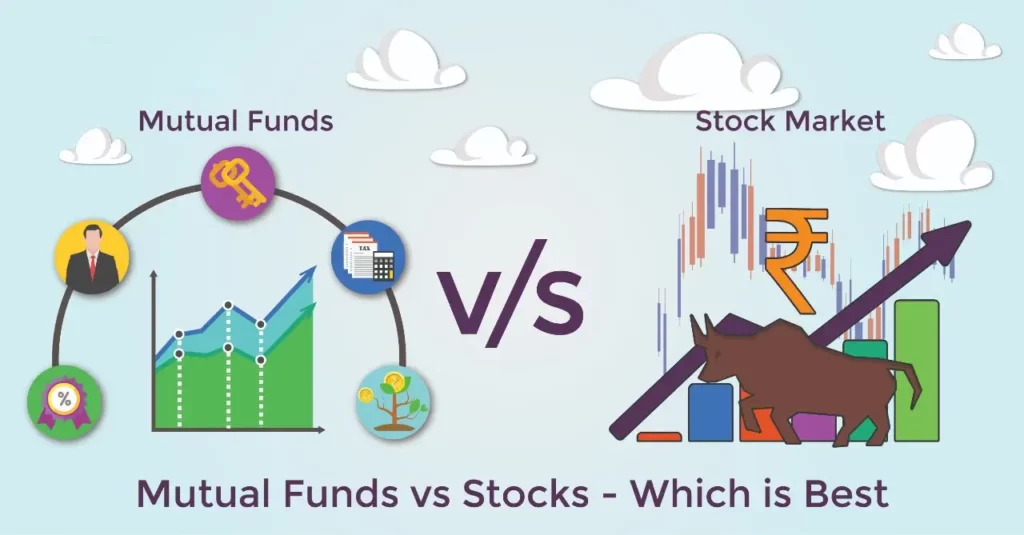Introduction : Mutual Funds Vs Stocks
Mutual Funds Vs Stocks? Mutual funds and stocks are two of the most common financial products available today. However, they are not created equally. When you invest in mutual funds, you pool your money with other investors to create a large fund that is then invested in various securities such as stocks or bonds. Mutual funds are ideal for people who don’t have the time, or expertise to pick individual investments or who want their investment strategy handled by an expert.
These Funds can be extremely beneficial because Mutual funds are a collection of securities that are professionally managed by a team of analysts, traders and portfolio managers. Mutual funds can be an excellent way to invest money because they take the guesswork out of investing. Instead of having to pick individual stocks or bonds, you simply buy shares in a mutual fund. Some mutual funds focus on specific sectors like technology stocks or real estate; others aim to mimic the performance of various stock indexes such as the S&P 500 index.
On the other hand if known the right strategy stocks can multiply your money 5 to 6 times in a very short timeframe. But remember You should have a perfect trading strategy and ample amount of time to master stocks in this kind of a volatile market!

Difference Between Mutual Funds and Stocks Investment
When you buy a share, you get legal ownership in the company with voting rights along with the entitlement to a share of the profits earned by the company. You can also participate in the Annual General Meetings and correspond with the company.
Buying stock, however, is direct participation in the Stock Market, the earnings from which can be in two ways:
- Dividends received and,
- Sale of stocks
When you invest in mutual funds, you get a share in the pooled fund collected by several investors. Your share is the number of units of mutual funds you purchased during the investment. Your rights and benefits are restricted to the mutual fund house.
Investing in mutual funds is in-direct participation in the share market.
If you have selected the “Dividend” option, then the fund house shares the dividend received. In case you have opted for the “Growth” option, then the dividends are reinvested in the fund to generate returns.
If you have selected the “Dividend” option, then the fund house shares the dividend received. In case you have opted for the “Growth” option, then the dividends are reinvested in the fund to generate returns.
Now that you understand the difference between mutual funds and stock market investments. Now let’s compare the features of stocks and mutual funds to understand which option is better for you.
When to buy stocks and mutual funds
Are you a new investor?
Are you are new to investments and do not have much idea about risks and returns? Mutual funds can prove to be a better option than direct investments in the stock market. A mutual fund also allows you to invest in instalments through a systematic investment plan (SIP). You can also choose different types of asset classes to invest your money in, depending on your financial goals, returns expectations and risk tolerance. Mutual fund corpuses are managed by highly skilled fund managers who can make better investment decisions during a volatile market. Direct stock investments can be highly risky for a new investor as a wrong decision can easily cost significant losses to the investor.
Do you have sufficient time and expertise to manage risk and ensure a good return?
Do you have sufficient time to look after your investment portfolio? Can you effectively manage the risk when the stock market is volatile? If your answer is ‘no’ to either or both of the above questions. You might want to stay away from direct investments in the stock market and prefer top-rated mutual funds to invest your money in. On the other hand, if your answer is ‘yes’ to both the questions. Then the stock market can unfold ample opportunities for you to earn an attractive return.
While investing directly in the stock market, you need to dedicate sufficient time to study the market trends and manage the risks to ensure a higher return. If you invest in a mutual fund. The fund manager will take care of the risk management in the scheme and could provide the best return in all types of market conditions.
Want to diversify across different asset classes?
As mentioned above, if you are looking to invest in different types of asset classes like equity, debt, and gold, mutual funds could be the best option for you. Direct stock investments give you exposure only to one asset class; thus, you may miss the diversification benefit available under the mutual fund platform. In mutual funds, you also get a chance to select the investment type as per the time horizon in sync with your financial goals.
For example, you can invest in liquid or short-term debt funds. You want to invest for the short term, you can invest in equity funds for the long term and equity-linked savings schemes (ELSS) for tax deduction benefit up to Rs 1.5 lakh in a financial year under Section 80C of the I-T Act. Direct stock investments do not have any tax deduction benefits.

Do you have expertise in stock analysis?
If you have expert knowledge in selecting the right shares as per your risk appetite (i.e. independent knowledge and not just expert advice or hearsay). Direct stock investments can offer you great returns. However, you should ideally be aware of equity research tools like technical and fundamental analysis and should always stay updated with news related to your stocks. You don’t need to be an expert to invest money in mutual funds. However, basic knowledge could be of great help. A mutual fund may not offer you a multi-bagger return like the stock market, but it can provide you with a decent return with lower chances of losses if you invest smartly.
Stocks Vs Mutual Funds: the long term view!
You must invest in stocks and equity funds with a long term investment horizon. However, you must be able to time your exit from stocks. You may follow the buy and hold strategy with equity funds to achieve your long term financial goals.
You may invest in expert-curated mutual fund plans consisting of top-performing funds through the SIP. Also in mutual funds You don’t have to spend a lot of time researching individual stocks if you invest in an equity fund. The fund manager takes care of your investment and the research team picks the right stocks. However, you must check the important parameters such as portfolio of the fund. AMC track record, assets under management and investment style of the fund manager before investing your money in the equity fund.
Tax Benefits?
You don’t get any tax benefits if you invest in stocks. However, you are eligible for a tax deduction up to a maximum of Rs 1.5 lakh per annum. Under Section 80C if you invest in tax-saving mutual funds called equity linked saving schemes or ELSS. You may invest in ELSS for the twin-benefits of inflation-beating return and tax saving.
Also, As an individual, 15% Short Term Capital Gain (STCG) taxes are applicable if you sell the stock before completion of one year from the date of purchase.
Mutual fund entities, however, are not taxed for STCG on the stock sold. The gains are either distributed or reinvested in the mutual fund which ultimately can benefit you as a unit-holder.
But, you need to hold on your mutual fund investment for at least one year to avoid STCG tax yourself.

Conclusion : What Should You Do ?
Mutual Funds Vs Stocks? Mutual fund investments usually suit all kinds of investors, even those with a low-risk appetite. You may choose the type of mutual fund scheme(s) that are aligned with your financial and diversification goals. Direct stock investments are meant for those who understand it well and are ready to take the required risks. You may also choose both mutual funds and direct stock investments depending on your knowledge about the stock market, return requirement, risk appetite, diversification needs and availability of time to manage your investments.
Check out the best App For Mutual Fund Investments here!
